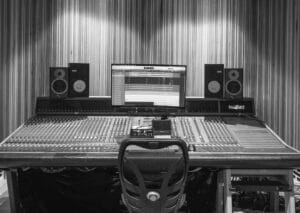Discover the World of Recording Studios: The Heart of Music Production
Recording studios are the beating heart of the music production process. Whether you’re a budding musician or an experienced producer, understanding how these magical spaces work can elevate your audio recording skills. This blog post explores the essentials of recording studios, the equipment involved, and why they are crucial for producing high-quality music.

What is a Recording Studio?
A recording studio is a specialized facility where music is recorded, mixed, and sometimes mastered. These studios are designed to capture sound with precision and clarity, providing an environment that minimizes external noise and offers superior acoustics. Recording studios are essential for creating professional-quality audio recordings, whether for music, podcasts, or other multimedia projects.
The Role of Recording Studios in Music Production
Recording studios are integral to the music production process. They provide musicians and producers with the tools and environment needed to capture and refine their sound. From laying down tracks to mixing and mastering, every step in the music production process is enhanced by the capabilities of a well-equipped recording studio.
Types of Recording Studios
- Home Studios: Ideal for hobbyists or beginners, these studios are set up in personal spaces like bedrooms or basements. They often utilize digital audio workstations (DAWs) and a few essential pieces of gear.
- Project Studios: A step up from home studios, project studios offer better equipment and acoustics. They are often used by independent musicians and smaller production companies.
- Professional Studios: These are state-of-the-art facilities with top-tier equipment and acoustics. Professional studios cater to major artists and record labels, offering the highest quality in audio recording and production.
Essential Equipment in a Recording Studio
Microphones
Microphones are crucial for capturing sound. Different types of microphones, such as condenser and dynamic mics, are used depending on the instrument or voice being recorded. Each type offers unique characteristics and is selected based on the desired sound quality.
Mixing Consoles
Mixing consoles, or mixing boards, are used to blend various audio tracks into a cohesive final product. They allow producers to adjust levels, add effects, and manipulate the sound to achieve the desired outcome.
Audio Interfaces
Audio interfaces are devices that connect microphones and instruments to the computer. They convert analog signals into digital data that can be processed by a DAW. High-quality audio interfaces are essential for maintaining sound fidelity.
Digital Audio Workstations (DAWs)
DAWs are software platforms used for recording, editing, and producing audio. They offer a range of tools for manipulating sound and are the backbone of modern music production. Popular DAWs include Pro Tools, Ableton Live, and Logic Pro.
Studio Monitors
Studio monitors are speakers designed for accurate sound reproduction. Unlike consumer speakers, which may color the sound, studio monitors present an unaltered version of the audio, allowing producers to make precise adjustments.
The Importance of Acoustics in a Recording Studio
Acoustics play a vital role in the quality of a recording studio. A well-treated room will have minimal reflections and reverberations, ensuring that the sound captured is as true to the source as possible. Acoustic treatment involves using materials like foam panels, bass traps, and diffusers to control sound waves within the space.
Soundproofing vs. Acoustic Treatment
It’s important to distinguish between soundproofing and acoustic treatment. Soundproofing prevents external noise from entering the studio, while acoustic treatment focuses on managing sound within the room. Both are essential for creating an optimal recording environment.
Advantages of Using a Professional Recording Studio
- Superior Equipment and Acoustics: Professional studios have access to high-end gear and expertly treated spaces, resulting in better sound quality.
- Experienced Engineers: Working with skilled sound engineers can elevate the quality of your recordings. Their expertise in capturing and mixing audio can make a significant difference.
- Creative Environment: Being in a professional studio can inspire creativity. The atmosphere, coupled with access to top-notch equipment, allows artists to focus solely on their music.
Tips for Choosing the Right Recording Studio
- Determine Your Needs: Identify what you need from a studio. Are you recording a full album or just a single track? Do you require specific equipment or instruments?
- Visit the Studio: If possible, visit the studio to assess the space and equipment. Check the acoustics and ensure they align with your sound objectives.
- Review Previous Work: Listen to recordings produced in the studio to gauge the quality of their work. This can provide insight into what you can expect from your sessions.
- Consider Your Budget: Professional studios can be expensive, so it’s important to find one that fits your budget while still meeting your needs.
Conclusion
Recording studios are an essential part of the music production process, providing the environment and tools necessary to create high-quality audio recordings. Whether you’re an aspiring musician or a seasoned producer, understanding the role of recording studios can help you make informed decisions and elevate your music. By investing in the right studio, you can ensure your recordings are of the highest quality and ready for the world to hear.

